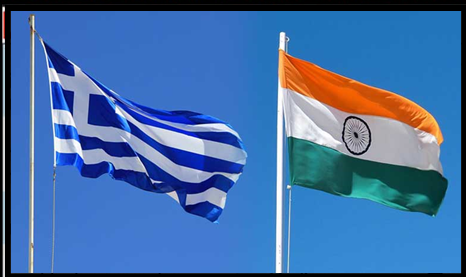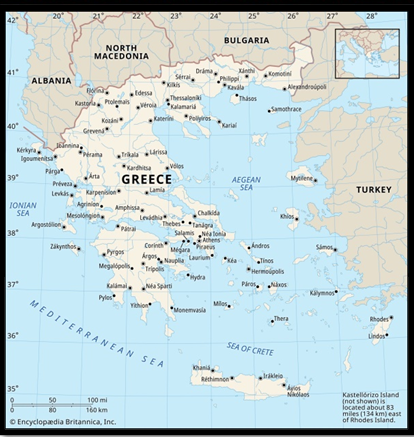GREECE’S GATEWAY TO ASIA, INDIA’S GATEWAY TO EUROPE
Syllabus:
GS 2:
- Bilateral, regional and global groupings and agreements involving India and/or affecting India’s interests.
Focus:
- Greek Prime Minister Kyriakos Mitsotakis’s visit to New Delhi on February 21-22 is been in focus.
Source:- India Today
The strategic relationship between India and Greece gained momentum with Prime Minister Narendra Modi’s visit to Greece in August 2023, followed by Greek Prime Minister Kyriakos Mitsotakis’s visit to New Delhi on February 21-22. Both leaders recognize the significant opportunities presented by a strategic partnership, with Mitsotakis highlighting Greece as India’s gateway to Europe and vice versa.
Strategic Importance
- Geopolitical Position: Greece and India are situated in strategically vital but geopolitically volatile regions, emphasizing the need for enhanced security and stability in the Eastern Mediterranean and Indian Ocean regions.
- Growing Ties: The increasing political will to strengthen Greece-India relations is driven by mutual recognition as old friends and emerging global powers.
Collaborative Focus Areas Between Greece and India
Defense and Security
- Enhanced Cooperation: Focus on maritime security, counter-terrorism, cyber security, and strengthening the defense industry.
- Dialogue Framework: Creation of an India-Greece dialogue mechanism at the National Security Advisors (NSAs) level for in-depth security discussions.
- Joint Exercises : The Greek and Indian Air Forces will collaborate on a joint training exercise with Su-30, F-16, and Rafale fighter jets for ten days over Greece and the Mediterranean Sea.
Maritime Security and Adherence to International Law
- Unified Vision: Support for a free, open, and rule-based maritime order in the Mediterranean Sea and Indo-Pacific regions.
- International Commitments: Commitment to the United Nations Convention on the Law of the Sea (UNCLOS), ensuring respect for sovereignty, territorial integrity, and freedom of navigation.
Cultural Exchange and Tourism
- Artistic and Cultural Cooperation: Promoting exchanges in the arts and cultural sectors.
- Heritage Preservation: Joint initiatives under UNESCO to protect and conserve historical sites.
Economic Engagement: Trade and Investment
- Trade Objectives: Target to double bilateral trade volumes by 2030.
- Sectoral Opportunities: Identifying and leveraging opportunities in renewable energy, infrastructure, pharmaceuticals, agriculture, and technology innovation.
- Economic Initiatives: The India-Middle East-Europe Economic Corridor (IMEEC) and the push for the EU-India Bilateral Trade and Investment Agreement (BTIA) are key areas for future cooperation.
Mobility and Migration
- Partnership Agreement: Progress towards the Mobility and Migration Partnership Agreement (MMPA) to benefit both nations.
- Workforce Mobility: Enhancing the free movement of professionals and workers between Greece and India.
Greece’s Gateway to Asia
- Geographical Position: Greece’s strategic location at the crossroads of Europe, Asia, and Africa serves as a natural gateway, especially through its port of Piraeus, facilitating trade and cultural exchanges between Asia and Europe.
- Port of Piraeus: The largest port in Greece, Piraeus is pivotal for maritime trade routes connecting Europe to Asia, significantly enhancing Greece’s role as a logistic and economic bridge.
- Historical Influence: Greece’s ancient maritime routes and colonies across the Aegean and the Mediterranean played a crucial role in spreading its culture and establishing connections with Asia.
- Modern Infrastructure: Recent investments in transportation and logistics infrastructure, including upgrades to the port of Piraeus by global shipping companies, have strengthened Greece’s position as a key entry point to Europe for Asian goods.
- Economic and Diplomatic Relations: Greece leverages its geographic advantage to bolster economic ties and diplomatic relations with Asian countries, serving as a facilitator of dialogue and cooperation between the continents.
India’s Gateway to Europe
- Geographical Advantage: India’s western coast, particularly Mumbai and Gujarat, serves as its primary gateway to Europe, enabling direct trade and maritime connections.
- Mumbai Port: As one of the largest and busiest ports in India, Mumbai acts as a crucial hub for maritime trade between India and European nations, facilitating the flow of goods, services, and capital.
- Cultural and Historical Links: India’s historical trade routes, including the ancient Silk Road, have served as conduits for cultural exchange and commerce between India and Europe for centuries.
- Strategic Partnerships: India engages in numerous strategic partnerships and free trade agreements with European countries, aiming to enhance economic ties, investment flows, and technological cooperation.
- Air Connectivity: Major Indian airports, such as Indira Gandhi International Airport in Delhi and Chhatrapati Shivaji Maharaj International Airport in Mumbai, offer extensive air connectivity to Europe, further supporting India’s role as a gateway for people, goods, and ideas.
2024 marks a critical point in solidifying the Greece-India strategic partnership, emphasizing the urgency and importance of these bilateral relations in the context of global and European dynamics.
Source:
Mains Practice Question:
“Examine the strategic significance of the evolving Greece-India partnership in the context of global geopolitics. Discuss the potential impact on regional security and economic growth. Highlight the areas of cooperation that can further strengthen this bilateral relationship.”





